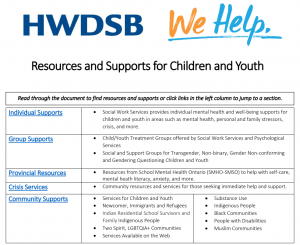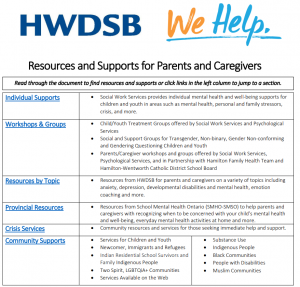
We Help Update – Winter 2023
 As the daytime light becomes shorter, the nighttime darkness becomes longer, and the temperatures become colder, it is not unusual to feel a decline in our mental wellness. There are ways that parents and caregivers can help their loved ones to navigate the colder months, manage exam and academic related stress in the new year, and help to improve their overall mental well-being. Stay tuned for our next We Help Update in March 2023!
As the daytime light becomes shorter, the nighttime darkness becomes longer, and the temperatures become colder, it is not unusual to feel a decline in our mental wellness. There are ways that parents and caregivers can help their loved ones to navigate the colder months, manage exam and academic related stress in the new year, and help to improve their overall mental well-being. Stay tuned for our next We Help Update in March 2023!
- Mental Health Activities for Elementary Students
- Mental Health Activities for Secondary Students
- Self- Care 101 for Students
- How to Support a Mentally Healthy Back to School for Your Child
In case of crisis, call 911 or visit your local hospital emergency room. For urgent support, contact Kids Help Phone (1-800-668-6868; www.kidshelpphone.ca; text CONNECT) or COAST Hamilton (905-972-8338; www.coasthamilton.ca).
- We Help Update Flyer – Winter 2023
- Community Supports and Mental Health Resources for Students
- Community Supports and Mental Health Resources for Parents and Caregivers
- Mental Health Resources by Topic
- Tip Sheet for Distressing Events
- Groups & Workshops for Students
- Groups & Workshops for Parents
- Supporting Students After Distressing Events
Transcend Youth Group
Transcend is a social and support group for transgender, non-binary, gender non-conforming and gender questioning children and youth from HWDSB schools. Group meetings are held once per month for two hours and are facilitated by peer leaders with lived experience. Transcend meetings are a welcoming environment which allows youth to develop social connections with others who share some aspect of their identity, so that they can help and support and learn from each other and from the facilitators.
Please contact [email protected] for more information.
AFFIRM
AFFIRM Is an eight-session Cognitive-Based Therapy informed treatment group specifically for Two Spirit and LGBTQIA+ youth to develop coping skills for anxiety and stress related to experiences of discrimination as a result of their sexual and gender identities. The goals of AFFIRM are to decrease unhelpful thoughts, feel better about yourself and lives, and to make healthy choices for sexual and mental health.
Register online at projectyouthaffirm.org/ or contact [email protected] if you have any questions.
TRAILS Anxiety and Depression
TRAILS (Transforming Research into Action to Improve the Lives of Students) groups are designed to help children and youth (grades 4 to 6, 7 to 8, and 9 to 12) who struggle with moderate symptoms of stress, anxiety, and/or depression by teaching evidence-based cognitive behavioral therapy (CBT) and mindfulness skills.
For more information, please contact the Principal/Vice-Principal or Social Worker at your school or Social Work Services (905) 527-5092 ext. 2806.
Teen Activation Group (TAG)
TAG is a treatment group for youth (grades 9 to 12) struggling with depression and anxiety who are not ready to access other treatment options. The group is based on Cognitive Behaviour Therapy (CBT) and Behaviour Activation Therapy. The goal of the group is to help children and youth to reduce their depressive and anxious symptoms and increase their overall activity level, so they can access other treatment options or so they no longer require treatment.
For more information, please contact the Principal/Vice-Principal or Social Worker at your school or Social Work Services (905) 527-5092 ext. 2806.
 More Resources for Students
More Resources for Students
Community Supports and Mental Health Resources for Students
Use HWDSB’s Community Supports and Mental Health Resources for Students list to find:
- Individual Supports
- Group Supports
- Provincial Resources
- Crisis Services
- Community Supports
Use the associated links to register, and find detailed descriptions for sessions in the menus below.
| Session Title | Date | Time | Link to Register/Attend |
| Families Worrying Less Together | January 17 |
12 p.m. | hwdsb.info/FWLT-Jan17afternoon |
| Families Worrying Less Together | January 17 | 6 p.m. | hwdsb.info/FWLT-Jan17evening |
| Emotion Coaching Webinar | January 18 | 9:30 a.m. | hwdsb.info/EC-Jan18 |
| Coping Strategies and Managing Stress (TAMI) | January 25 | 6:30 p.m. | hwdsb.info/TAMI-Jan25 |
| Emotion Coaching Webinar | February 9 | 6:30 p.m. | hwdsb.info/EC-Feb9 |
| Mental Health & Mental Illness (TAMI) | February 22 | 6:30 p.m. | hwdsb.info/TAMI-Feb22 |
| Emotion Coaching Webinar | March 7 | 3:30 p.m. | hwdsb.info/EC-Mar7 |
| Difficult Conversations (TAMI) | March 22 | 6:30 p.m. | hwdsb.info/TAMI-March22 |
Emotion Coaching
Emotion Coaching is a communication strategy that can calm the brain in as little as 60 seconds and help improve relationships.
Hamilton-Wentworth District School Board, Hamilton-Wentworth Catholic District School Board, and Hamilton Family Health Team invite parents and caregivers to explore Emotion Coaching in a 90-minute webinar, and if interested, a six-week parent/caregiver group for further learning. Click the following links to register for one of the 90-minute webinars:
January 18 from 9:30-11 a.m. – hwdsb.info/EC-Jan18
February 9 from 6:30-8 p.m. – hwdsb.info/EC-Feb9
March 7 from 3:30-5 p.m. – hwdsb.info/EC-Mar7
To register for the six-week parent/caregiver group, please call the Hamilton Family Health Team, Mental Health Groups line at 905-667-4852. We encourage caregivers to participate in a webinar before joining the caregiver group, however, it is not required.
What is Emotion Coaching?
Emotion Coaching is a communication strategy that can calm the brain in as little as 60 seconds, and help improve relationships. Emotion Coaching has two steps:
- Validation: Letting someone know we understand why they feel, think or act a certain way.
- Support: Then, we provide emotional and practical support using strategies like reassurance, limit-setting, redirecting, collaborative problem-solving, teaching skills, etc.
Learning in Webinars
- Introduction to Emotion Coaching and how it can improve relationships with your child/youth
- Understanding the role of emotions
- Linking Emotion Coaching to neuroscience
- Reviewing Emotion Coaching approaches
PDF Flyer: Emotion Coaching for Parents/Caregivers Winter 2023
Parent/Caregiver Cheat Sheet: Emotion Coaching Cheat Sheet for Parents and Caregivers
Video: Learn more about Emotion Coaching at HWDSB
Families Worrying Less Together
If you are the parent/primary caregiver of a student in grades JK to 8 who is excessively shy or has intense worries and fears, come learn about the Families Worrying Less Together program. This program will give you practical strategies to help your child learn to cope differently. Please note: This program is for parents and primary caregivers, children do not attend. Please register using the following links:
January 17 from 12-1 p.m. – hwdsb.info/FWLT-Jan17afternoon
January 17 from 6-7 p.m. – hwdsb.info/FWLT-Jan17evening
Canadian Mental Health Association: Talking About Mental Illness (TAMI) Presentations
Coping Strategies and Managing Stress
January 25 from 6:30-7:30 p.m. – hwdsb.info/TAMI-Jan25
Understanding the Difference between Mental Health & Mental Illness & Normalizing Emotions February 22, 2023, 6:30pm-7:30 p.m. – hwdsb.info/TAMI-Feb22
How to Have Difficult Conversations with your Family, Children & Friends
March 22, 2023, 6:30pm-7:30 p.m. – hwdsb.info/TAMI-March22
Transcend Group for Caregivers
Transcend is a social and support group for caregivers of transgender, non-binary, gender non-conforming and gender questioning children and youth. Group meetings are held once/month for two hours to provide an opportunity to share the ups, downs and questions about your child’s gender identity, gender fluidity and transition with a welcoming group of caregivers, with support from a facilitator with lived experience who works in the Hamilton trans community.
Please contact [email protected] for more information.
More Resources for Parents
Community Supports and Mental Health Resources for Parents and Caregivers

Use HWDSB’s Community Supports and Mental Health Resources for Parents list to find:
- Individual Supports
- Workshops & Groups
- Resources by Topic
- Provincial Resources
- Crisis Services
- Community Supports
Click here for a Tip Sheet for Adults Supporting Children and Youth Distressing Events
We are all shocked and saddened when a stressful event occurs in our community or in the world. We may feel sadness, grief, helplessness, anxiety and anger. Whatever we feel is okay. When supporting a child or youth, please consider the following points.
- Take care of your own feelings and needs
- Help children and youth feel safe
- Acknowledge and validate feelings
- Be a good listener and observer
- Support: respond to changes in behaviour
- Identify children and youth who might be at risk
Updated on Thursday, January 12, 2023.

